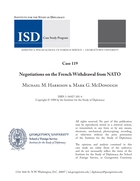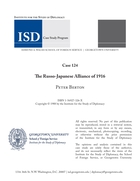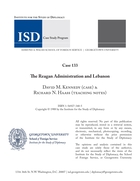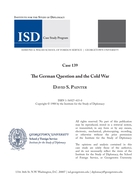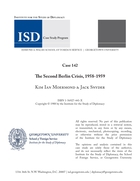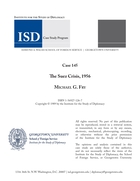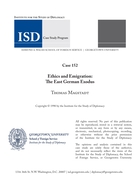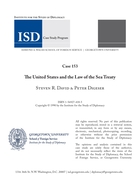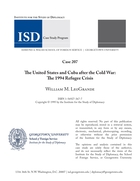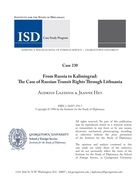Browse Titles - 16 results
Negotiations on the French Withdrawal from NATO
written by Mark G. McDonough, fl. 1988 and M. John Harrison, 1945-, in Institute for the Study of Diplomacy Case Study Program, Case 119 (District of Columbia: Georgetown University. School of Foreign Service. Institute for the Study of Diplomacy, 1988), 21 page(s)
This case study describes the negotiations accompanying the process of France’s withdrawal from the North Atlantic Treaty Organization’s integrated military system, including the expulsion of NATO units from French soil. It focuses on negotiations among allies who retain common political security interests, de...
Sample
written by Mark G. McDonough, fl. 1988 and M. John Harrison, 1945-, in Institute for the Study of Diplomacy Case Study Program, Case 119 (District of Columbia: Georgetown University. School of Foreign Service. Institute for the Study of Diplomacy, 1988), 21 page(s)
Description
This case study describes the negotiations accompanying the process of France’s withdrawal from the North Atlantic Treaty Organization’s integrated military system, including the expulsion of NATO units from French soil. It focuses on negotiations among allies who retain common political security interests, despite some strong differences concerning principles of national and Western defense. As such, the case is particularly useful for cours...
This case study describes the negotiations accompanying the process of France’s withdrawal from the North Atlantic Treaty Organization’s integrated military system, including the expulsion of NATO units from French soil. It focuses on negotiations among allies who retain common political security interests, despite some strong differences concerning principles of national and Western defense. As such, the case is particularly useful for courses on international negotiation and bargaining, and for courses involving alliance organizations and Western security affairs.
Show more
Show less
Field of Study
Global Issues
Content Type
Case study
Author / Creator
Mark G. McDonough, fl. 1988, M. John Harrison, 1945-
Date Published / Released
1988
Publisher
Georgetown University. School of Foreign Service. Institute for the Study of Diplomacy
Series
Institute for the Study of Diplomacy Case Study Program
Person Discussed
Charles de Gaulle, 1890-1970
Topic / Theme
France and its Borders, Negotiation in government, Military alliances, International relations, Civil defense, Politics & Policy, British, Americans, French, 20th Century in World History (1914--2000)
Copyright Message
Copyright © 1988 The Institute for the Study of Diplomacy
×
The Russo-Japanese Alliance of 1916
written by Peter Berton, 1922-2014, in Institute for the Study of Diplomacy Case Study Program, Case 124 (District of Columbia: Georgetown University. School of Foreign Service. Institute for the Study of Diplomacy, 1988), 30 page(s)
This case study examines the complex negotiations between Japan and Russia during World War I, which culminated in a treaty of alliance in July 1916. It also demonstrates how reversal of traditional enmity works and how alignments often change in the pursuit of the same goals. This study will contribute to an unde...
Sample
written by Peter Berton, 1922-2014, in Institute for the Study of Diplomacy Case Study Program, Case 124 (District of Columbia: Georgetown University. School of Foreign Service. Institute for the Study of Diplomacy, 1988), 30 page(s)
Description
This case study examines the complex negotiations between Japan and Russia during World War I, which culminated in a treaty of alliance in July 1916. It also demonstrates how reversal of traditional enmity works and how alignments often change in the pursuit of the same goals. This study will contribute to an understanding of the dynamics of international relations in a non-European setting, during one of the most crucial periods in modern histor...
This case study examines the complex negotiations between Japan and Russia during World War I, which culminated in a treaty of alliance in July 1916. It also demonstrates how reversal of traditional enmity works and how alignments often change in the pursuit of the same goals. This study will contribute to an understanding of the dynamics of international relations in a non-European setting, during one of the most crucial periods in modern history. This case can be taught in courses on international relations in the Asia/Pacific region, diplomatic relations in East Asia, international history of the 19th and 20th centuries, Russian foreign policy, or Japanese foreign policy.
Show more
Show less
Field of Study
World History
Content Type
Case study
Author / Creator
Peter Berton, 1922-2014
Date Published / Released
1988
Publisher
Georgetown University. School of Foreign Service. Institute for the Study of Diplomacy
Series
Institute for the Study of Diplomacy Case Study Program
Topic / Theme
Border Events and Areas Context, History, Politics & Policy, Diplomacy, 20th Century in World History (1914--2000)
Copyright Message
Copyright © 1988 The Institute for the Study of Diplomacy
×
The Reagan Administration and Lebanon
written by Richard N. Haass, 1951- and David M. Kennedy, 1941-, in Institute for the Study of Diplomacy Case Study Program, Case 133 (District of Columbia: Georgetown University. School of Foreign Service. Institute for the Study of Diplomacy, 1988), 22 page(s)
When Israel invaded Lebanon in June 1982, the United States became deeply involved. Different elements in the U.S. government were at odds over policy issues: the pace and direction the U.S.-brokered negotiations should take; whether to pressure Israel to moderate its demands; whether U.S. military power should bo...
Sample
written by Richard N. Haass, 1951- and David M. Kennedy, 1941-, in Institute for the Study of Diplomacy Case Study Program, Case 133 (District of Columbia: Georgetown University. School of Foreign Service. Institute for the Study of Diplomacy, 1988), 22 page(s)
Description
When Israel invaded Lebanon in June 1982, the United States became deeply involved. Different elements in the U.S. government were at odds over policy issues: the pace and direction the U.S.-brokered negotiations should take; whether to pressure Israel to moderate its demands; whether U.S. military power should bolster diplomatic efforts; and the degree to which the U.S. should view the Lebanon issue as a superpower confrontation. This case study...
When Israel invaded Lebanon in June 1982, the United States became deeply involved. Different elements in the U.S. government were at odds over policy issues: the pace and direction the U.S.-brokered negotiations should take; whether to pressure Israel to moderate its demands; whether U.S. military power should bolster diplomatic efforts; and the degree to which the U.S. should view the Lebanon issue as a superpower confrontation. This case study is intended to stimulate a discussion on supporting diplomacy with military power, and of how the interests of U.S. executive agencies shape policymaking. It can be used as a complement to “The War Powers Resolution and U.S. Policy in Lebanon, 1982-1984” (Case Study 184).
Show more
Show less
Field of Study
World History
Content Type
Case study
Author / Creator
Richard N. Haass, 1951-, David M. Kennedy, 1941-
Date Published / Released
1988
Publisher
Georgetown University. School of Foreign Service. Institute for the Study of Diplomacy
Series
Institute for the Study of Diplomacy Case Study Program
Person Discussed
George Pratt Shultz, 1920-, Philip Charles Habib, 1920-1992
Topic / Theme
Israel, Jordan, Lebanon, Palestine, and Syria Borders, Politics & Policy, Diplomacy, 20th Century in World History (1914--2000)
Copyright Message
Copyright © 1988 The Institute for the Study of Diplomacy
×
The German Question and the Cold War
written by David S. Painter, 1948-, in Institute for the Study of Diplomacy Case Study Program, Case 139 (District of Columbia: Georgetown University. School of Foreign Service. Institute for the Study of Diplomacy, 1988), 22 page(s)
This case study is designed to highlight the link between two problems: the origins of the Cold War, and the resolution of the “German Question”: the belief that whoever controlled Germany could dominate the whole of Europe and tilt the global balance of power against its rival. Indeed, the country’s strateg...
Sample
written by David S. Painter, 1948-, in Institute for the Study of Diplomacy Case Study Program, Case 139 (District of Columbia: Georgetown University. School of Foreign Service. Institute for the Study of Diplomacy, 1988), 22 page(s)
Description
This case study is designed to highlight the link between two problems: the origins of the Cold War, and the resolution of the “German Question”: the belief that whoever controlled Germany could dominate the whole of Europe and tilt the global balance of power against its rival. Indeed, the country’s strategic, economic, and political importance made both East and West fearful of the prospect of a unified Deutschland aligning itself with th...
This case study is designed to highlight the link between two problems: the origins of the Cold War, and the resolution of the “German Question”: the belief that whoever controlled Germany could dominate the whole of Europe and tilt the global balance of power against its rival. Indeed, the country’s strategic, economic, and political importance made both East and West fearful of the prospect of a unified Deutschland aligning itself with the other side. This case asks students to analyze what the United States and its allies were likely to gain through negotiations with the Soviets versus what they could achieve, and to a large extent had already achieved, through negotiations among themselves. It could be paired with Case Study 147, “Deciding Germany’s Future, 1943-1945.”
Show more
Show less
Field of Study
World History
Content Type
Case study
Author / Creator
David S. Painter, 1948-
Date Published / Released
1988
Publisher
Georgetown University. School of Foreign Service. Institute for the Study of Diplomacy
Series
Institute for the Study of Diplomacy Case Study Program
Person Discussed
George F. Kennan, 1904-2005
Topic / Theme
Germany and its Borders, Cold War, 1945-1989, Berlin Blockade, Berlin, Germany, 1948-1949, History, Diplomacy, Politics & Policy, 20th Century in World History (1914--2000)
Copyright Message
Copyright © 1988 The Institute for the Study of Diplomacy
×
The Second Berlin Crisis, 1958-1959
written by Jack Snyder, 1951- and Kim Ian Moermond, fl. 1988, in Institute for the Study of Diplomacy Case Study Program, Case 142 (District of Columbia: Georgetown University. School of Foreign Service. Institute for the Study of Diplomacy, 1988), 22 page(s)
Twice during the postwar period, the West countered Soviet threats against Berlin—a fact that makes these episodes perfect material for case studies of crisis diplomacy. The second clash, the subject of this case study, began in 1958, when Soviet General Secretary Nikita Khrushchev renounced the agreements his g...
Sample
written by Jack Snyder, 1951- and Kim Ian Moermond, fl. 1988, in Institute for the Study of Diplomacy Case Study Program, Case 142 (District of Columbia: Georgetown University. School of Foreign Service. Institute for the Study of Diplomacy, 1988), 22 page(s)
Description
Twice during the postwar period, the West countered Soviet threats against Berlin—a fact that makes these episodes perfect material for case studies of crisis diplomacy. The second clash, the subject of this case study, began in 1958, when Soviet General Secretary Nikita Khrushchev renounced the agreements his government had made with the Allies on Berlin a decade earlier and threatened to take further measures if Western forces did not pull ou...
Twice during the postwar period, the West countered Soviet threats against Berlin—a fact that makes these episodes perfect material for case studies of crisis diplomacy. The second clash, the subject of this case study, began in 1958, when Soviet General Secretary Nikita Khrushchev renounced the agreements his government had made with the Allies on Berlin a decade earlier and threatened to take further measures if Western forces did not pull out. The study analyzes the advantages and disadvantages of both options for the West, before revealing the path Washington took.
Show more
Show less
Field of Study
World History
Content Type
Case study
Author / Creator
Jack Snyder, 1951-, Kim Ian Moermond, fl. 1988
Date Published / Released
1988
Publisher
Georgetown University. School of Foreign Service. Institute for the Study of Diplomacy
Series
Institute for the Study of Diplomacy Case Study Program
Person Discussed
John Foster Dulles, 1888-1959, Nikita Khrushchev, 1894-1971
Topic / Theme
Germany and its Borders, Cold War, 1945-1989, History, Diplomacy, Politics & Policy, 20th Century in World History (1914--2000)
Copyright Message
Copyright © 1988 The Institute for the Study of Diplomacy
×
The Suez Crisis, 1956
written by Michael G. Fry, 1934-, in Institute for the Study of Diplomacy Case Study Program, Case 145 (District of Columbia: Georgetown University. School of Foreign Service. Institute for the Study of Diplomacy, 1989), 32 page(s)
Egyptian President Gamal Abd al-Nasser precipitated an international crisis when, on July 26, 1956, he announced his decision to nationalize the Suez Canal. However, through the implementation of a cease-fire by Israel, Britain, and France, the crisis ended on November 7 of that year. This case study is well-suite...
Sample
written by Michael G. Fry, 1934-, in Institute for the Study of Diplomacy Case Study Program, Case 145 (District of Columbia: Georgetown University. School of Foreign Service. Institute for the Study of Diplomacy, 1989), 32 page(s)
Description
Egyptian President Gamal Abd al-Nasser precipitated an international crisis when, on July 26, 1956, he announced his decision to nationalize the Suez Canal. However, through the implementation of a cease-fire by Israel, Britain, and France, the crisis ended on November 7 of that year. This case study is well-suited for courses on bargaining and negotiating theory, or any class that explores the historical approach to the study of international re...
Egyptian President Gamal Abd al-Nasser precipitated an international crisis when, on July 26, 1956, he announced his decision to nationalize the Suez Canal. However, through the implementation of a cease-fire by Israel, Britain, and France, the crisis ended on November 7 of that year. This case study is well-suited for courses on bargaining and negotiating theory, or any class that explores the historical approach to the study of international relations.
Show more
Show less
Field of Study
Global Issues
Content Type
Case study
Author / Creator
Michael G. Fry, 1934-
Date Published / Released
1989
Publisher
Georgetown University. School of Foreign Service. Institute for the Study of Diplomacy
Series
Institute for the Study of Diplomacy Case Study Program
Person Discussed
Anthony Eden, 1897-1977, Dwight D. Eisenhower, 1890-1969, John Foster Dulles, 1888-1959, Gamal Abdel Nasser, 1918-1970
Topic / Theme
Egypt and its Borders, Suez Crisis, 1956, History, Diplomacy, Politics & Policy, 20th Century in World History (1914--2000)
Copyright Message
Copyright © 1989 The Institute for the Study of Diplomacy
×
Ethics and Emigration: The East German Exodus
written by Thomas M. Magstadt, fl. 1990, in Institute for the Study of Diplomacy Case Study Program, Case 152 (District of Columbia: Georgetown University. School of Foreign Service. Institute for the Study of Diplomacy, 1990, originally published 1990), 14 page(s)
In the fall of 1989, thousands of East Germans defied Prime Minister Erich Honecker and his regime’s ban on unauthorized departure from the German Democratic Republic and escaping to West Germany through Hungary, Poland, and Czechoslovakia. This case study, created for the Carnegie Council on Ethics and Internat...
Sample
written by Thomas M. Magstadt, fl. 1990, in Institute for the Study of Diplomacy Case Study Program, Case 152 (District of Columbia: Georgetown University. School of Foreign Service. Institute for the Study of Diplomacy, 1990, originally published 1990), 14 page(s)
Description
In the fall of 1989, thousands of East Germans defied Prime Minister Erich Honecker and his regime’s ban on unauthorized departure from the German Democratic Republic and escaping to West Germany through Hungary, Poland, and Czechoslovakia. This case study, created for the Carnegie Council on Ethics and International Affairs, explores a series of policy-relevant ethics issues: What does it mean to be a citizen of choice? How does this relate to...
In the fall of 1989, thousands of East Germans defied Prime Minister Erich Honecker and his regime’s ban on unauthorized departure from the German Democratic Republic and escaping to West Germany through Hungary, Poland, and Czechoslovakia. This case study, created for the Carnegie Council on Ethics and International Affairs, explores a series of policy-relevant ethics issues: What does it mean to be a citizen of choice? How does this relate to prevailing notions of human rights? And what can and should nations do to promote “the freedom of movement?”
Show more
Show less
Field of Study
World History
Content Type
Case study
Author / Creator
Thomas M. Magstadt, fl. 1990
Date Published / Released
1990
Publisher
Georgetown University. School of Foreign Service. Institute for the Study of Diplomacy
Series
Institute for the Study of Diplomacy Case Study Program
Person Discussed
Erich Honecker, 1912-1994
Topic / Theme
Germany and its Borders, Cold War, 1945-1989, Fall of Berlin Wall, November 9, 1989, Diplomacy, Politics & Policy, 20th Century in World History (1914--2000)
Copyright Message
Copyright © 1990 The Institute for the Study of Diplomacy
×
The United States and the Law of the Sea Treaty
written by Peter Digeser, 1958- and Steven R. David, 1951-, in Institute for the Study of Diplomacy Case Study Program, Case 153 (District of Columbia: Georgetown University. School of Foreign Service. Institute for the Study of Diplomacy, 1990), 20 page(s)
This case study traces the U.S. role in the lengthy negotiations on codification of the U.N. Convention on the Law of the Sea. It begins with the Nixon administration’s 1970 decision to submit its own proposal to the U.N. Seabed Committee, and then analyzes the evolution of Washington’s strategy during the var...
Sample
written by Peter Digeser, 1958- and Steven R. David, 1951-, in Institute for the Study of Diplomacy Case Study Program, Case 153 (District of Columbia: Georgetown University. School of Foreign Service. Institute for the Study of Diplomacy, 1990), 20 page(s)
Description
This case study traces the U.S. role in the lengthy negotiations on codification of the U.N. Convention on the Law of the Sea. It begins with the Nixon administration’s 1970 decision to submit its own proposal to the U.N. Seabed Committee, and then analyzes the evolution of Washington’s strategy during the various negotiating sessions (UNCLOS I, II and III) held between 1974 and 1982. Although the U.S. never ratified the U.N. Law of the Sea T...
This case study traces the U.S. role in the lengthy negotiations on codification of the U.N. Convention on the Law of the Sea. It begins with the Nixon administration’s 1970 decision to submit its own proposal to the U.N. Seabed Committee, and then analyzes the evolution of Washington’s strategy during the various negotiating sessions (UNCLOS I, II and III) held between 1974 and 1982. Although the U.S. never ratified the U.N. Law of the Sea Treaty (as the agreement is generally known) the Clinton administration’s decision to recognize and abide by its terms when it came into force in 1994 suggests that the negotiating process advanced American interests. This case study illustrates the problems of conducting large-scale, multilateral negotiations over an extended period. This case can be paired with Case Study 136, “Should the Reagan Administration Have Signed the U.N. Convention on the Law of the Sea?”
Show more
Show less
Field of Study
World History
Content Type
Case study
Author / Creator
Peter Digeser, 1958-, Steven R. David, 1951-
Date Published / Released
1990
Publisher
Georgetown University. School of Foreign Service. Institute for the Study of Diplomacy
Series
Institute for the Study of Diplomacy Case Study Program
Topic / Theme
Border Events and Areas Context, Ocean mining, U.N. Convention on the Law of the Sea, 1982, Law, Diplomacy, Politics & Policy, 20th Century in World History (1914--2000)
Copyright Message
Copyright © 1990 The Institute for the Study of Diplomacy
×
The United States and Cuba after the Cold War: The 1994 Refugee Crisis
written by William M. LeoGrande, fl. 1986, in Institute for the Study of Diplomacy Case Study Program, Case 207 (District of Columbia: Georgetown University. School of Foreign Service. Institute for the Study of Diplomacy, 1995), 17 page(s)
This case study examines the Clinton administration’s response to the rapid influx of Cuban refugees into the United States in 1994. Part A describes U.S.-Cuban relations during the Cold War, the roots of the 1994 refugee crisis, and the dilemma the Clinton administration faced as it sought to resolve this probl...
Sample
written by William M. LeoGrande, fl. 1986, in Institute for the Study of Diplomacy Case Study Program, Case 207 (District of Columbia: Georgetown University. School of Foreign Service. Institute for the Study of Diplomacy, 1995), 17 page(s)
Description
This case study examines the Clinton administration’s response to the rapid influx of Cuban refugees into the United States in 1994. Part A describes U.S.-Cuban relations during the Cold War, the roots of the 1994 refugee crisis, and the dilemma the Clinton administration faced as it sought to resolve this problem. Part B examines the administration’s response, and the outcome of the U.S.-Cuban negotiations to staunch the flow of refugees int...
This case study examines the Clinton administration’s response to the rapid influx of Cuban refugees into the United States in 1994. Part A describes U.S.-Cuban relations during the Cold War, the roots of the 1994 refugee crisis, and the dilemma the Clinton administration faced as it sought to resolve this problem. Part B examines the administration’s response, and the outcome of the U.S.-Cuban negotiations to staunch the flow of refugees into the United States. The case can be used in courses on international relations or foreign policy, and to illustrate the dynamics of crisis management.
Show more
Show less
Field of Study
Global Issues
Content Type
Case study
Author / Creator
William M. LeoGrande, fl. 1986
Date Published / Released
1995
Publisher
Georgetown University. School of Foreign Service. Institute for the Study of Diplomacy
Series
Institute for the Study of Diplomacy Case Study Program
Person Discussed
Lawton Mainor Chiles, Jr., 1930-1998, Janet Reno, 1938-2016, John F. Kennedy, 1917-1963, Fulgencio Batista, 1901-1973, Fidel Castro, 1926-2016, William Jefferson Clinton, 1946-
Topic / Theme
Sea Migrations, Cuba and the United States Border, Immigration laws, International relations, Crisis management, Negotiation in government, Refugees, Government policy, United States Imposes Embargo Against Cuba, October 19, 1960, Cuban Revolution, 1956-1959, Cuban Missile Crisis, 1962, Cold War, 1945-1989, Law, Politics & Policy, Americans, Cubans, Russians, 20th Century in World History (1914--2...
Sea Migrations, Cuba and the United States Border, Immigration laws, International relations, Crisis management, Negotiation in government, Refugees, Government policy, United States Imposes Embargo Against Cuba, October 19, 1960, Cuban Revolution, 1956-1959, Cuban Missile Crisis, 1962, Cold War, 1945-1989, Law, Politics & Policy, Americans, Cubans, Russians, 20th Century in World History (1914--2000)
Show more
Show less
Copyright Message
Copyright © 1995 The Institute for the Study of Diplomacy
×
From Russia to Kaliningrad: The Case of Russian Transit Rights Through Lithuania
written by Audrius Lazdinis, fl. 1996 and Jeanne A. K. Hey, fl. 1996, in Institute for the Study of Diplomacy Case Study Program, Case 230 (District of Columbia: Georgetown University. School of Foreign Service. Institute for the Study of Diplomacy, 1996), 11 page(s)
This case study describes the Lithuanian-Russian negotiations over Russian transit rights through newly independent Lithuania to the isolated, yet militarily important enclave of Kaliningrad. The case analyzes foreign policy decision-making in a small, relatively poor state (Lithuania) with strong historical and c...
Sample
written by Audrius Lazdinis, fl. 1996 and Jeanne A. K. Hey, fl. 1996, in Institute for the Study of Diplomacy Case Study Program, Case 230 (District of Columbia: Georgetown University. School of Foreign Service. Institute for the Study of Diplomacy, 1996), 11 page(s)
Description
This case study describes the Lithuanian-Russian negotiations over Russian transit rights through newly independent Lithuania to the isolated, yet militarily important enclave of Kaliningrad. The case analyzes foreign policy decision-making in a small, relatively poor state (Lithuania) with strong historical and contemporary ties to a large, dominant state (Russia)— portrays the difficulties of working out the nuts and bolts of foreign policy a...
This case study describes the Lithuanian-Russian negotiations over Russian transit rights through newly independent Lithuania to the isolated, yet militarily important enclave of Kaliningrad. The case analyzes foreign policy decision-making in a small, relatively poor state (Lithuania) with strong historical and contemporary ties to a large, dominant state (Russia)— portrays the difficulties of working out the nuts and bolts of foreign policy agreements in any country. This case can be paired with “The Long Good-Bye: The Withdrawal of Russian Military Forces from the Baltic States” (Case Study 230) and “After the Empire: Estonia and Russia Negotiate Borders and Citizenship” (Case Study 251).
Show more
Show less
Field of Study
Global Issues
Content Type
Case study
Author / Creator
Audrius Lazdinis, fl. 1996, Jeanne A. K. Hey, fl. 1996
Date Published / Released
1996
Publisher
Georgetown University. School of Foreign Service. Institute for the Study of Diplomacy
Series
Institute for the Study of Diplomacy Case Study Program
Person Discussed
Algirdas Brazauskas, 1932-2010, Boris Nikolayevich Yeltsin, 1931-2007
Topic / Theme
Eastern European Borders, Crossing borders, Negotiation in government, International relations, Dissolution of the Union of Soviet Socialist Republics, December 26, 1991, Geography, Politics & Policy, 20th Century in World History (1914--2000)
Copyright Message
Copyright © 1996 The Institute for the Study of Diplomacy
×

